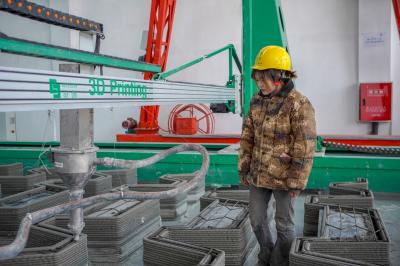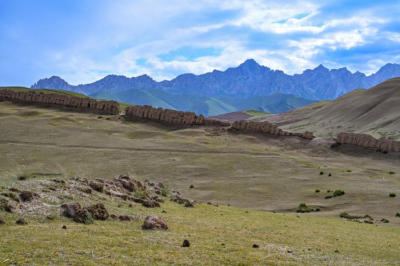 People dance during an event to celebrate Serfs' Emancipation Day in Nagqu of southwest China's Tibet Autonomous Region, March 28, 2022. (Xinhua/Zhou Dixiao)
In a memorial hall set up for the emancipation of about 1 million serfs in southwest China's Tibet Autonomous Region, a historic event in 1959, Phutsering, himself a descendant of serfs, narrates the dark past to visitors as a docent volunteer.
Phutsering, 78, was once destined for a life of servitude following in the footsteps of his serf parents.
Around the time when he was born, the blight of slavery had largely been eradicated from the face of the Earth, yet Tibet was still firmly in its clutches.
"Even if the snowy mountains turn into yak butter, they will still be occupied by the lords; even if the rivers turn into milk, we still won't be able to drink a single drop..." read the sentences on display in the memorial hall in Lhasa, the regional capital.
By the late 1950s, Tibet's three major stakeholders -- local officials, aristocrats and higher-ranking lamas in the monasteries -- and their agents accounted for less than 5 percent of the total population, but controlled almost all its wealth, while about 95 percent of Tibet's population were serfs and slaves who had to struggle just to survive.
"Although my parents were both serfs and their lives were only worth a straw rope, they had always given me the best and taught me to be honest," recalled Phutsering, adding that his parents were the only hope and light in his life in those dark years, guiding him to a brighter tomorrow.
He still remembers what his father had always taught him: being honest.
Under the guidance of his father, Phutsering became a man of integrity. After graduating from primary and junior high school in Xigaze, he took up translation work as his career to help build a new and free Tibet.
Last July, Phutsering applied to be a docent at the regional liberation memorial hall. "We have to engrave this dark history in our memories, though it was terribly cruel," he said. "I have the duty to tell the stories of the past to more people so that they can better cherish today's happy life."
"Phutsering is my role model. What I have learned from him is not only skills as a docent, but also his integrity and selfless dedication he developed during the dark era," said Dolma Lhamo, Phutsering's 26-year-old colleague.
"A warm spring is in sight and people in Tibet nowadays have completely come out of the pre-1959 darkness," said Phutsering. "I now enjoy a colorful retired life and I hope to continue to do something meaningful for society."
|
- Home
- News Tibet |Exclusive |China |World |Related News |Latest
- Documents White Papers |Others
- Photo Politics |Economy & Society |Culture & Religion |Human & Nature |Beautiful Tibet |Other Tibetan-Inhabited Area |Exchanges |Related
- Video News |Documentary |Micro-Video |Entertainment
- Art
- Tourism
- In Focus
- About Tibet






